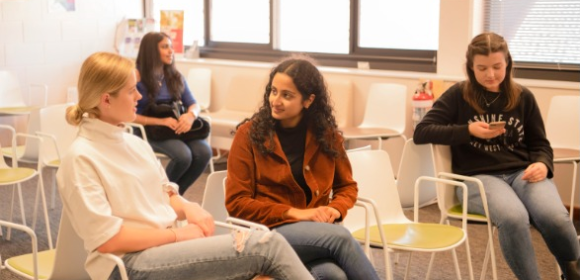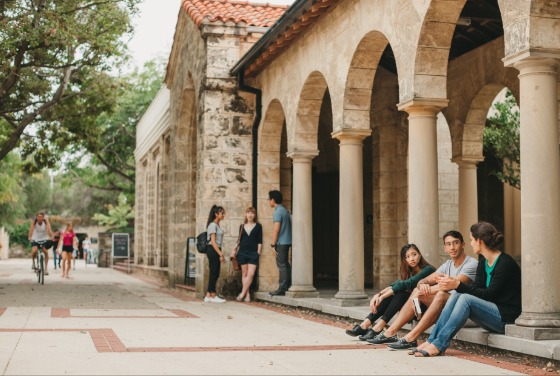UniAccess
At UWA there are over 3,000 students who have a medical condition and/or disability that may impact their capacity to study and their performance. UniAccess is a team of highly qualified advisors who support students with a disability or an ongoing, temporary or episodic medical condition. UniAccess also supports students who are carers of someone with a medical condition or disability.
What does support look like?
UniAccess work with students to provide individualised solutions to enable academic success and can offer support in a variety of ways:
- Ensuring course material is accessible
- Help to maximise academic potential
- Give advice on individual disability-related matters
- Facilitate physical access to and around campus
- Recommend and loan out assistive technology and software
- Liaise with relevant departments and faculties as required
- Make alternative arrangements for examinations
- Match students with support assistants, (e.g. note takers)
- Support students who are carers of people with chronic medical conditions or disability
- Provide information and advice to prospective students and their families
Registered students can see all of their approved adjustments by logging into the Access platform.
How to make an appointment?
UniAccess offers both in-person and virtual appointments (phone or MS Teams).
- For current UWA students, you can book an appointment
- For prospective students, call the UniAccess call-back service on 6488 4630 or email [email protected] to make an appointment
For your first appointment, please bring along documentation from your health professional (e.g. GP, psychologist, physiotherapist, occupational therapist, psychiatrist, etc) that outlines your diagnosis and its impact on your studies. Your health professional can fill out the health professional report form or provide an existing report. If you don't have a recent report or letter from a health professional, you can bring the health professional report form to your GP or make an appointment at the UWA Medical Centre.
Please ensure you update your information on studentConnect to reflect your status as a student disclosing a medical condition or disability.
Unsure if we can help? Contact us to discuss further.
Where are we located?
UniAccess is located on the first floor or the Student Central Building (opposite UniPrint). We are open from 8.30am – 4pm, Monday to Friday.
For accessible parking locations, consult our Accessibility map UWA accessibility map [PDF]
Thinking of studying at UWA?
If you have a disability or medical condition and would like to enquire about assistance before you enrol, please contact us, and one of the accessibility advisors can answer your questions.
Other information
-
Exams and Assessments
If you’re likely to require alternative exam arrangements as a result of your disability or medical condition, such as extra time or use of specialised equipment, please make an appointment with UniAccess as soon as possible to discuss further. Making an appointment early in the semester allows enough time to organise your arrangements well before the examination or assessment dates.
Alternative exam arrangements
After your appointment, you will be provided with an accessibility plan which will outline the exam arrangements (and will not include any health information) that you can provide to each of your unit coordinators for school based assessments.
The exam office are automatically notified for centrally timetabled exams.
If you are issued with alternative exam arrangements, ensure you have indicated on your enrolment/re-enrolment on studentConnect that you have a disability or medical condition.
If your situation changes and your alternative exam arrangements are no longer appropriate, make another appointment with an Accessibility Adviser.
Any discrepancies between what has been approved and what is on your exam timetable should be reported via askUWA to the Exams team. If you have alternative exam arrangements for mid-semester, laboratory, practical exams and/or tests, present your accessibility plan (UAAP) to your unit coordinator at least two weeks before the test.
Duration
If you have temporary or fluctuating conditions, you can expect your arrangements to be reviewed regularly, or set to expire after a semester (or sooner). Part of this review process requires updated or current medical documents. Ask your doctor or health professional to provide an updated letter (or fill out the health professional form) to make sure your medical documents remain current.
If you have ongoing or permanent conditions, your arrangements will remain in place for the duration of your enrolment, unless you request a review.
In-class assessments and tests
You have a right to expect that your alternative exam arrangements will be applied to any school-administered assessments. It is your responsibility to notify the unit coordinator at least two weeks before the assessment by presenting a copy of your accessibility plan.
Special consideration
Learn more about special consideration via this link.
-
Accessing course materials
We can arrange the conversion of course materials to alternative formats, such as RTF, DAISY or Braille, for students who have a print disability.
Obtaining course materials
If you require assistance such as captioning, get in touch with us. We’ll liaise with unit coordinators. .
Lecture recordings and other services
If you have any issues accessing your lecture recordings, LMS or unit readings please get in touch with us or your unit coordinator.
-
Assistive Technology
A range of equipment to facilitate individualised learning needs is available on loan. We also arrange equipment, technology and furniture for students with alternative exam arrangements.
We can provide allocated study spaces in the Reid and Barry J Marshall libraries if you have a medical condition or disability. These study spaces have a range of equipment, software, ergonomic furniture, and a rest area. Lockers can be made available for you and are reviewed on a semester basis.
See the Library website for more information.
-
Physical access on campus
Get in touch if you'd like to discuss how to access campus buildings, teaching spaces, parking areas, lifts and toilets.
You can also report any problems or obstacles you face when accessing University spaces to Campus Management. Our access and mobility map indicates accessible entrances, toilets, lifts and parking.
Accessible parking permits are available through UniAccess upon presentation of a Health Professional’s report.
-
Carers and support workers on campus
Some students attend UWA with their carers and/or external support persons, such as support workers, who provide students with non-academic support. Our Information Guide contains important information on the roles and responsibilities of the University and of the carers/external support persons.
-
Mentoring
Would you like a peer mentor to assist you to navigate university life? Contact us if you would like to be involved in our Specialist Mentoring Program.
We also have an Autism social group running in collaboration with the Guild.
-
Career advice
Located in the Careers and Employability Centre (Ground floor, Student Central), the team can help with:
- finding relevant work experience
- links to accessible graduate opportunities which match your interest and field of study
- guidance on your rights disclosing a disability
- support after university to ensure you settle in to your new role
- direct referrals to UWA services and programs that may also benefit you
For more information visit the Careers Hub
You can also access career support via the Australian Disability Network's Stepping Into Internship program, a four-week paid internship for university students with disability.
-
Scholarships
UWA scholarships
UWA Alumni Fund Inspire Scholarship
Students with a disability or chronic medical condition or students with carer responsibilities are welcome to apply for this award.
The Scholarships Office provides information on scholarships that, while are not solely for students with a disability, will take disability into consideration.
External scholarships
Australian Disability Clearing House on Education and Training has a comprehensive list of the scholarships and grants available to students with disability.
-
Useful Links
- UWA Accessibility Map [PDF, 365KB]
- Disability Services Commission of Western Australia
- National Disability Insurance Scheme
- Human Rights and Equal Opportunity Commission
- People with Disability WA
- beyondblue: the National Depression Initiative
- Disclosure
- Overcoming Procrastination
- Overcoming Perfectionism
- Psycho Educational Assessment [DOC, 71KB]
- Psycho Educational Assessment [PDF, 160KB]
- Disability Works Australia
- Australian Network on Disability
-
Policies and Legislation
The UWA Policy on Disability and Medical Conditions outlines the University's obligations under the Disability Discrimination Act (1992) (DDA), the Disability Standards for Education (2005), the Disability Services Act (1992), and the Equal Opportunity Act (1984) to minimise and prevent unlawful discrimination on the grounds of disability or medical condition in education, employment, accommodation, access to premises, clubs and sports, and the provision of facilities and services.
University policies and guidelines
A number of policies and legislation inform the provision of services to students with disability.
- UWA Disability Policy
- UWA Mental Health Policy
- UWA Web Accessibility Policy
- Disability Access and Inclusion Implementation Schedule 2020–2025 [PDF, 139KB]
Legislation and codes
- Disability Standards for Education (Cwlth) – clarifies the obligations of education and training service providers, and the rights of people with disability, under the Disability Discrimination Act 1992.
- Disabilities Services Act 1986 (Cwlth) [PDF, 165KB]
- Disabilities Services Act 1993 (WA)
- Disability Discrimination Act 1992 (Cwlth)
- Human Rights and Equal Opportunity Commission Act 1986 (Cwlth)
- Equal Opportunity Act 1984 (WA)







